-

Dec
09
Interpretive Summary: Impacts of high amylopectin starch cassava on plasma glucose and the growth performance of pigs
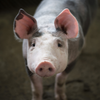
In this recent Journal of Animal Science study, researchers evaluated how cassava, a high amylopectin starch, impacted the performance and other metabolic parameters of growing pigs. Pigs were fed either a corn-soybean meal LP diet, a corn-cassava-soybean meal LP diet, or a cassava-soybean meal LP diet.
Read more
-

Dec
09
Interpretive Summary: Hydroxy-selenomethionine as an organic source of selenium in the diet improves boar reproductive performance in artificial insemination programs
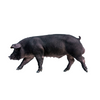
This was the first study of record to evaluate the effects of hydroxy-selenomethionine as a dietary supplement for boards on raw semen characteristics and quality of seminal doses, as well as the reproductive performance achieved when used for artificial insemination.
Read more
-

Dec
09
Interpretive Summary: Effect of aspirin to intentionally induce leaky gut on performance, inflammation, and carcass characteristics of feedlot cattle
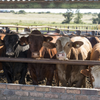
The negative impacts of stress on gastrointestinal tract barrier function can result in compromised animal growth and health; aspirin is known to cause mucosal injury, leading to increased gut permeability and tight junction damage and, in turn, can be used as a model to study leaky gut in cattle.
Read more
-

Dec
06
Interpretive Summary: Impacts of fiber and crude protein on performance and gut microbiota in piglets
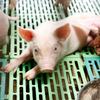
The prophylactic use of antibiotics and pharmacological zinc were traditionally used to ward off postweaning diarrhea (PWD) in piglets. However, due to antibiotic resistance and strict regulations on the use of zinc and antibiotics in animal feed, other strategies for combatting PWD are needed.
Read more
-

Dec
06
Interpretive Summary: Effects of increasing calcium propionate in a finishing diet on dry matter intake and glucose metabolism in steers
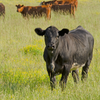
A study recently published in the Journal of Animal Science aimed to determine whether or not increasing propionate alters dry matter intake, glucose clearance rate, blood metabolites, insulin concentrations, and hepatic gene expression in steers fed a finishing diet.
Read more
-

Dec
06
Interpretive Summary: Impacts of lysed Corynebacterium glutamicum cell mass on the health and growth of nursery piglets
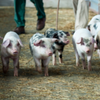
Single cell proteins (SCP) are nutrient dense and derived from various economical sources including bacteria and yeast. However, the safety profile of SCP and its and impact on production in farm animals are still under investigation.
Read more
-

Dec
02
Interpretive Summary: Genetic inbreeding depression load for fertility traits in Pura Raza Española mares

Over the last few decades, fertility has been studied as a breeding goal in domestic species, but horses have historically been selected for conformation or performance in equestrian sports without much regard to fertility. For this reason, there is little information available on fertility traits and their inclusion as selection criteria in equine breeding programs.
Read more
-

Dec
02
Interpretive Summary: Integrating diverse data sources to predict disease risk in dairy cattle—a machine learning approach
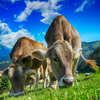
Livestock farming is currently undergoing a digital revolution. Animals and their surroundings are closely monitored and observed, but such data often reside in disconnected silos, making it impossible to leverage their full potential to improve animal well-being.
Read more
-

Dec
02
Interpretive Summary: Assessment of digestible lysine requirements in lipopolysaccharide-challenged pigs
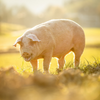
Changes in metabolism due to immune system activation and the incidence of infectious disease can lead to differing dietary amino acid requirements for an animal. In addition, it is imperative to determine the nutritional requirements of animals under challenging conditions, so feed formulations are optimal to maximize growth rate and efficient use of nutrients.
Read more
-

Nov
29
USDA to Reduce Salmonella Associated with Poultry

The United States Department of Agriculture’s (USDA) Food Safety and Inspection Service (FSIS) has announced new strategies to reduce Salmonella illness linked to poultry products. The efforts will include gathering data and information to support future actions to move closer to the Healthy People 2030 target of a 25% reduction in Salmonella illness.
Read more
-

Nov
29
Giving Tuesday opportunities - 2021

ASAS and the ASAS Foundation recognize members on Giving Tuesday.
Read more
-

Nov
29
School Food Recovery Act Reintroduced

The School Recovery Act was recently introduced to direct the United States Department of Agriculture (USDA) to provide competitive grants to support schools working on food waste reduction programs. “Reducing food waste in schools will give students the opportunity to develop responsible habits that can benefit their communities and our planet throughout their lives,” said Bonamici in a press release.
Read more
-

Nov
29
Review of Pandemic Food Box Expenditures Results Released

The government hired hundreds of private companies last spring to buy food no longer needed by restaurants, schools, and cruise ships, and transport it to overwhelmed food banks. The program faced several problems such as spilled and spoiled food, high costs, and uneven distribution nationwide.
Read more
-

Nov
29
NIFA to Invest Over $50 Million in New Farmers and Ranchers

“We recognize that beginning farmers and ranchers have unique needs for education, training, and technical assistance. Their success, especially in the first 10 years, often hinges on access to reliable, science-based information and the latest educational resources so they can improve their operations’ profitability and sustainability long-term.”
Read more
-

Nov
29
IFIC Survey States Most Americans Have Tried Plant-Based Meat Alternatives

The International Food Information Council (IFIC) released the results of a survey about plant-based meat alternatives. The purpose of the survey was to see how often plant alternatives are consumed and why. It should be noted that the study was funded by SNI Global (formally the Soy Nutrition Institute) and the United Soybean Board.
Read more
-

Nov
29
Food Prices Continue to Increase Ahead of Thanksgiving
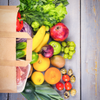
As the holidays approach, the price to prepare your celebratory dinner will likely be higher this year. Factors including the COVID-19 pandemic, labor shortages, transportation costs, and supply chain issues are to blame.
Read more
-

Nov
29
Cattle Contract Library Act of 2021 Advances

A new bill introduced and approved by the House Agriculture Committee would offer transparency in the discrepancy between what cattle producers receive and what consumers are paying for beef.
Read more
-

Nov
29
Animal Activists Upset Over COP26 Menu

The United Nations Climate Change Conference (COP26) was held in Glasgow, Scotland. The event had local and seasonal offerings and took a “plant-forward approach”, with 40% of the menu being plant-based options. The menus also feature a carbon footprint graphic of each item so attendees can be informed of the impact of their choices.
Read more
-

Nov
29
Agriculture Innovation Mission for Climate Established

During the 26th United Nations Climate Change Conference (COP26), the United States and United Arab Emirates (UAE), along with 31 other countries and 48 non-government partners, announced the Agriculture Innovation Mission for Climate (AIM for Climate). “The United States is proud to be launching the Agriculture Innovation Mission for Climate initiative alongside the United Arab Emirates and over 80 partners across the globe," said John Kerry, US special presidential envoy for the climate.
Read more
-

Nov
22
Interpretive Summary: Thyroid hormone suppression in feeder pigs following polymicrobial or porcine reproductive and respiratory syndrome virus-2 challenge
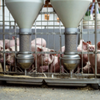
The swine industry continuously battles infectious disease challenges; unfortunately, the nature of our intensive management makes it particularly vulnerable. Understanding how the numerous physiological systems respond to disease is advantageous to scientists working to establish immunity.
Read more
 DecInterpretive Summary: Impacts of high amylopectin starch cassava on plasma glucose and the growth performance of pigs
DecInterpretive Summary: Impacts of high amylopectin starch cassava on plasma glucose and the growth performance of pigs In this recent Journal of Animal Science study, researchers evaluated how cassava, a high amylopectin starch, impacted the performance and other metabolic parameters of growing pigs. Pigs were fed either a corn-soybean meal LP diet, a corn-cassava-soybean meal LP diet, or a cassava-soybean meal LP diet.
In this recent Journal of Animal Science study, researchers evaluated how cassava, a high amylopectin starch, impacted the performance and other metabolic parameters of growing pigs. Pigs were fed either a corn-soybean meal LP diet, a corn-cassava-soybean meal LP diet, or a cassava-soybean meal LP diet. DecInterpretive Summary: Hydroxy-selenomethionine as an organic source of selenium in the diet improves boar reproductive performance in artificial insemination programs
DecInterpretive Summary: Hydroxy-selenomethionine as an organic source of selenium in the diet improves boar reproductive performance in artificial insemination programs This was the first study of record to evaluate the effects of hydroxy-selenomethionine as a dietary supplement for boards on raw semen characteristics and quality of seminal doses, as well as the reproductive performance achieved when used for artificial insemination.
This was the first study of record to evaluate the effects of hydroxy-selenomethionine as a dietary supplement for boards on raw semen characteristics and quality of seminal doses, as well as the reproductive performance achieved when used for artificial insemination. DecInterpretive Summary: Effect of aspirin to intentionally induce leaky gut on performance, inflammation, and carcass characteristics of feedlot cattle
DecInterpretive Summary: Effect of aspirin to intentionally induce leaky gut on performance, inflammation, and carcass characteristics of feedlot cattle The negative impacts of stress on gastrointestinal tract barrier function can result in compromised animal growth and health; aspirin is known to cause mucosal injury, leading to increased gut permeability and tight junction damage and, in turn, can be used as a model to study leaky gut in cattle.
The negative impacts of stress on gastrointestinal tract barrier function can result in compromised animal growth and health; aspirin is known to cause mucosal injury, leading to increased gut permeability and tight junction damage and, in turn, can be used as a model to study leaky gut in cattle. DecInterpretive Summary: Impacts of fiber and crude protein on performance and gut microbiota in piglets
DecInterpretive Summary: Impacts of fiber and crude protein on performance and gut microbiota in piglets The prophylactic use of antibiotics and pharmacological zinc were traditionally used to ward off postweaning diarrhea (PWD) in piglets. However, due to antibiotic resistance and strict regulations on the use of zinc and antibiotics in animal feed, other strategies for combatting PWD are needed.
The prophylactic use of antibiotics and pharmacological zinc were traditionally used to ward off postweaning diarrhea (PWD) in piglets. However, due to antibiotic resistance and strict regulations on the use of zinc and antibiotics in animal feed, other strategies for combatting PWD are needed. DecInterpretive Summary: Effects of increasing calcium propionate in a finishing diet on dry matter intake and glucose metabolism in steers
DecInterpretive Summary: Effects of increasing calcium propionate in a finishing diet on dry matter intake and glucose metabolism in steers A study recently published in the Journal of Animal Science aimed to determine whether or not increasing propionate alters dry matter intake, glucose clearance rate, blood metabolites, insulin concentrations, and hepatic gene expression in steers fed a finishing diet.
A study recently published in the Journal of Animal Science aimed to determine whether or not increasing propionate alters dry matter intake, glucose clearance rate, blood metabolites, insulin concentrations, and hepatic gene expression in steers fed a finishing diet. DecInterpretive Summary: Impacts of lysed Corynebacterium glutamicum cell mass on the health and growth of nursery piglets
DecInterpretive Summary: Impacts of lysed Corynebacterium glutamicum cell mass on the health and growth of nursery piglets Single cell proteins (SCP) are nutrient dense and derived from various economical sources including bacteria and yeast. However, the safety profile of SCP and its and impact on production in farm animals are still under investigation.
Single cell proteins (SCP) are nutrient dense and derived from various economical sources including bacteria and yeast. However, the safety profile of SCP and its and impact on production in farm animals are still under investigation. DecInterpretive Summary: Genetic inbreeding depression load for fertility traits in Pura Raza Española mares
DecInterpretive Summary: Genetic inbreeding depression load for fertility traits in Pura Raza Española mares Over the last few decades, fertility has been studied as a breeding goal in domestic species, but horses have historically been selected for conformation or performance in equestrian sports without much regard to fertility. For this reason, there is little information available on fertility traits and their inclusion as selection criteria in equine breeding programs.
Over the last few decades, fertility has been studied as a breeding goal in domestic species, but horses have historically been selected for conformation or performance in equestrian sports without much regard to fertility. For this reason, there is little information available on fertility traits and their inclusion as selection criteria in equine breeding programs. DecInterpretive Summary: Integrating diverse data sources to predict disease risk in dairy cattle—a machine learning approach
DecInterpretive Summary: Integrating diverse data sources to predict disease risk in dairy cattle—a machine learning approach Livestock farming is currently undergoing a digital revolution. Animals and their surroundings are closely monitored and observed, but such data often reside in disconnected silos, making it impossible to leverage their full potential to improve animal well-being.
Livestock farming is currently undergoing a digital revolution. Animals and their surroundings are closely monitored and observed, but such data often reside in disconnected silos, making it impossible to leverage their full potential to improve animal well-being. DecInterpretive Summary: Assessment of digestible lysine requirements in lipopolysaccharide-challenged pigs
DecInterpretive Summary: Assessment of digestible lysine requirements in lipopolysaccharide-challenged pigs Changes in metabolism due to immune system activation and the incidence of infectious disease can lead to differing dietary amino acid requirements for an animal. In addition, it is imperative to determine the nutritional requirements of animals under challenging conditions, so feed formulations are optimal to maximize growth rate and efficient use of nutrients.
Changes in metabolism due to immune system activation and the incidence of infectious disease can lead to differing dietary amino acid requirements for an animal. In addition, it is imperative to determine the nutritional requirements of animals under challenging conditions, so feed formulations are optimal to maximize growth rate and efficient use of nutrients. NovUSDA to Reduce Salmonella Associated with Poultry
NovUSDA to Reduce Salmonella Associated with Poultry The United States Department of Agriculture’s (USDA) Food Safety and Inspection Service (FSIS) has announced new strategies to reduce Salmonella illness linked to poultry products. The efforts will include gathering data and information to support future actions to move closer to the Healthy People 2030 target of a 25% reduction in Salmonella illness.
The United States Department of Agriculture’s (USDA) Food Safety and Inspection Service (FSIS) has announced new strategies to reduce Salmonella illness linked to poultry products. The efforts will include gathering data and information to support future actions to move closer to the Healthy People 2030 target of a 25% reduction in Salmonella illness. NovGiving Tuesday opportunities - 2021
NovGiving Tuesday opportunities - 2021 ASAS and the ASAS Foundation recognize members on Giving Tuesday.
ASAS and the ASAS Foundation recognize members on Giving Tuesday. NovSchool Food Recovery Act Reintroduced
NovSchool Food Recovery Act Reintroduced The School Recovery Act was recently introduced to direct the United States Department of Agriculture (USDA) to provide competitive grants to support schools working on food waste reduction programs. “Reducing food waste in schools will give students the opportunity to develop responsible habits that can benefit their communities and our planet throughout their lives,” said Bonamici in a press release.
The School Recovery Act was recently introduced to direct the United States Department of Agriculture (USDA) to provide competitive grants to support schools working on food waste reduction programs. “Reducing food waste in schools will give students the opportunity to develop responsible habits that can benefit their communities and our planet throughout their lives,” said Bonamici in a press release. NovReview of Pandemic Food Box Expenditures Results Released
NovReview of Pandemic Food Box Expenditures Results Released The government hired hundreds of private companies last spring to buy food no longer needed by restaurants, schools, and cruise ships, and transport it to overwhelmed food banks. The program faced several problems such as spilled and spoiled food, high costs, and uneven distribution nationwide.
The government hired hundreds of private companies last spring to buy food no longer needed by restaurants, schools, and cruise ships, and transport it to overwhelmed food banks. The program faced several problems such as spilled and spoiled food, high costs, and uneven distribution nationwide. NovNIFA to Invest Over $50 Million in New Farmers and Ranchers
NovNIFA to Invest Over $50 Million in New Farmers and Ranchers “We recognize that beginning farmers and ranchers have unique needs for education, training, and technical assistance. Their success, especially in the first 10 years, often hinges on access to reliable, science-based information and the latest educational resources so they can improve their operations’ profitability and sustainability long-term.”
“We recognize that beginning farmers and ranchers have unique needs for education, training, and technical assistance. Their success, especially in the first 10 years, often hinges on access to reliable, science-based information and the latest educational resources so they can improve their operations’ profitability and sustainability long-term.” NovIFIC Survey States Most Americans Have Tried Plant-Based Meat Alternatives
NovIFIC Survey States Most Americans Have Tried Plant-Based Meat Alternatives The International Food Information Council (IFIC) released the results of a survey about plant-based meat alternatives. The purpose of the survey was to see how often plant alternatives are consumed and why. It should be noted that the study was funded by SNI Global (formally the Soy Nutrition Institute) and the United Soybean Board.
The International Food Information Council (IFIC) released the results of a survey about plant-based meat alternatives. The purpose of the survey was to see how often plant alternatives are consumed and why. It should be noted that the study was funded by SNI Global (formally the Soy Nutrition Institute) and the United Soybean Board. NovFood Prices Continue to Increase Ahead of Thanksgiving
NovFood Prices Continue to Increase Ahead of Thanksgiving As the holidays approach, the price to prepare your celebratory dinner will likely be higher this year. Factors including the COVID-19 pandemic, labor shortages, transportation costs, and supply chain issues are to blame.
As the holidays approach, the price to prepare your celebratory dinner will likely be higher this year. Factors including the COVID-19 pandemic, labor shortages, transportation costs, and supply chain issues are to blame. NovCattle Contract Library Act of 2021 Advances
NovCattle Contract Library Act of 2021 Advances A new bill introduced and approved by the House Agriculture Committee would offer transparency in the discrepancy between what cattle producers receive and what consumers are paying for beef.
A new bill introduced and approved by the House Agriculture Committee would offer transparency in the discrepancy between what cattle producers receive and what consumers are paying for beef. NovAnimal Activists Upset Over COP26 Menu
NovAnimal Activists Upset Over COP26 Menu The United Nations Climate Change Conference (COP26) was held in Glasgow, Scotland. The event had local and seasonal offerings and took a “plant-forward approach”, with 40% of the menu being plant-based options. The menus also feature a carbon footprint graphic of each item so attendees can be informed of the impact of their choices.
The United Nations Climate Change Conference (COP26) was held in Glasgow, Scotland. The event had local and seasonal offerings and took a “plant-forward approach”, with 40% of the menu being plant-based options. The menus also feature a carbon footprint graphic of each item so attendees can be informed of the impact of their choices. NovAgriculture Innovation Mission for Climate Established
NovAgriculture Innovation Mission for Climate Established During the 26th United Nations Climate Change Conference (COP26), the United States and United Arab Emirates (UAE), along with 31 other countries and 48 non-government partners, announced the Agriculture Innovation Mission for Climate (AIM for Climate). “The United States is proud to be launching the Agriculture Innovation Mission for Climate initiative alongside the United Arab Emirates and over 80 partners across the globe," said John Kerry, US special presidential envoy for the climate.
During the 26th United Nations Climate Change Conference (COP26), the United States and United Arab Emirates (UAE), along with 31 other countries and 48 non-government partners, announced the Agriculture Innovation Mission for Climate (AIM for Climate). “The United States is proud to be launching the Agriculture Innovation Mission for Climate initiative alongside the United Arab Emirates and over 80 partners across the globe," said John Kerry, US special presidential envoy for the climate. NovInterpretive Summary: Thyroid hormone suppression in feeder pigs following polymicrobial or porcine reproductive and respiratory syndrome virus-2 challenge
NovInterpretive Summary: Thyroid hormone suppression in feeder pigs following polymicrobial or porcine reproductive and respiratory syndrome virus-2 challenge The swine industry continuously battles infectious disease challenges; unfortunately, the nature of our intensive management makes it particularly vulnerable. Understanding how the numerous physiological systems respond to disease is advantageous to scientists working to establish immunity.
The swine industry continuously battles infectious disease challenges; unfortunately, the nature of our intensive management makes it particularly vulnerable. Understanding how the numerous physiological systems respond to disease is advantageous to scientists working to establish immunity.



